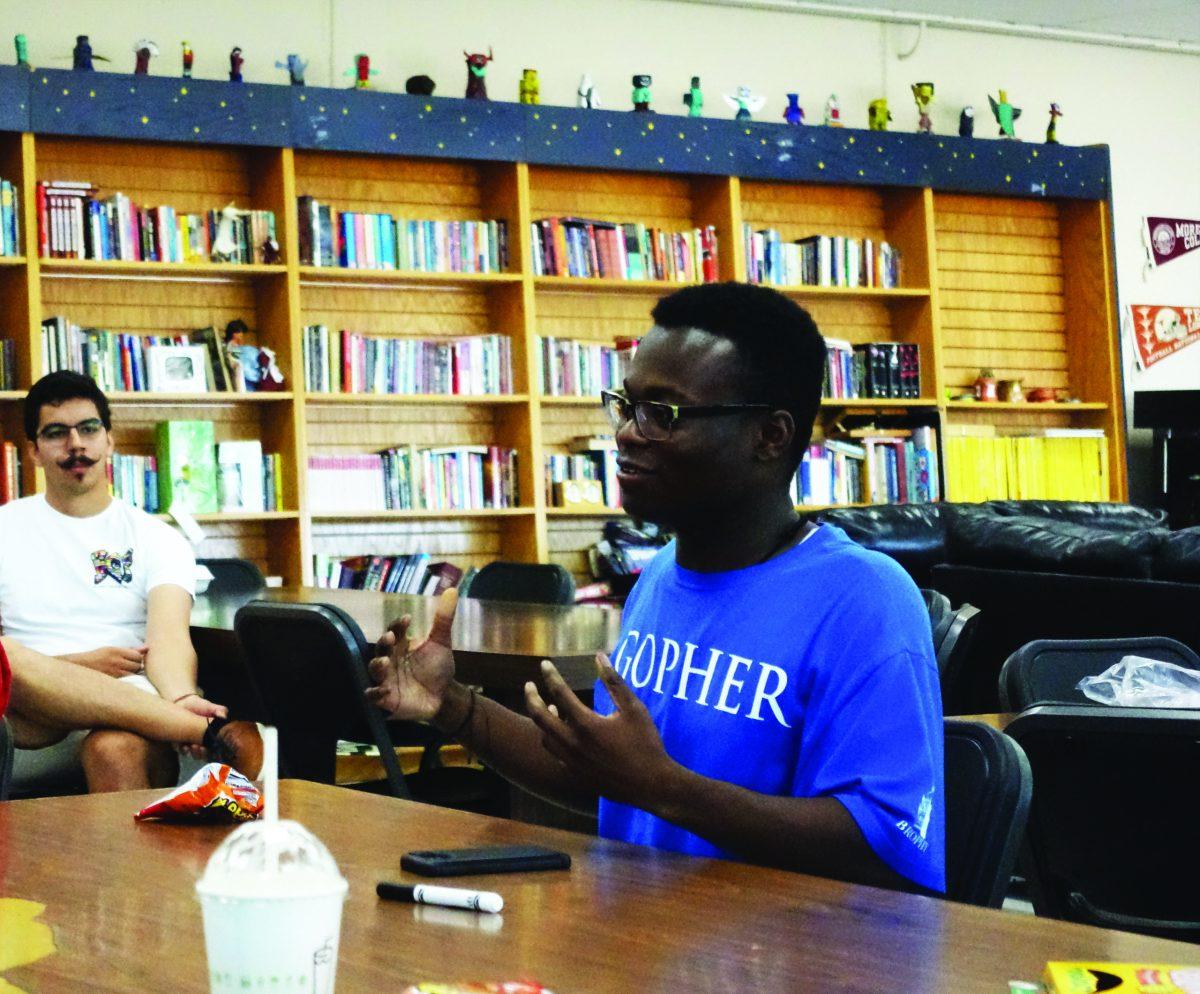Photo by Hunter Franklin ’19 | Axell Komlan ’18 speaks during a Brophy Culture Project Meeting.
Graham Armknecht ’18
THE ROUNDUP
In the last ten years, Brophy has strived to achieve a more diverse student body that is representative of Maricopa county as a whole.
In the Class of 2021, 40% of students are non-Caucasian, according to Brophy’s website.
Mr. Jonathan Londaño ’10, the Student Advocacy and Outreach Coordinator on campus, stated that he’s proud of the steps Brophy has taken.
“I’m proud of Brophy as an alumnus and now as a faculty member for its mission to be a diverse school,” Mr. Londaño said. “My job is to make sure that it’s an inclusive place and that students have the opportunity to pursue what they want to pursue.”
Axell-Giovani Komlan ’18, an active member in the Black Student Union and the Brophy Culture Project, agreed with Mr. Londaño’s remarks.
“I’d say that, seeing how Brophy’s demographics have changed in the last few years, Brophy’s done pretty well with diversity,” Komlan said. “40% of the student body is now a student of color. Not to mention that with Brophy Culture Project underway, the Brophy Community is doing well in tackling issues of diversity, not only on campus, but also in our society.”
Jake Miller ’19, a Jewish student on campus, said that outside of Mass, he doesn’t feel excluded.
“For the most part, [being a Jewish student at Brophy] is an alright experience. There are times where it’s difficult to be Jewish in this environment,” Miller said. “For example, it’s hard to participate at Mass when you can’t participate in everything. However, I’m comfortable with the religion class itself because Mr. Quentin Orem is pretty open with everything that we do, and is pretty understanding. We can present our own opinion and we don’t have to follow the exact Catholic Church Doctrine.”
Miller described how Honors Ignatian Encounter, a new honors religion course with a retreat in the fall and spring, is focused on community building, which allows many people to enter into the classes.
“Especially with Honors Ignatian Encounter and on our [fall] retreat, it’s a lot of community building and it’s through the Catholic background and through the love of Jesus. While I can’t relate to that, in general the environment of the class has been pretty good.”
On a different note, Señor Ian Munro remarked that Brophy is improving with diversity in his short time here.
“I think diversity on campus is improving,” Mr. Munro said. “Obviously, I’ve only been here for four years, this is my fifth. I’ve seen a lot of strides to try to embrace the diverse community of Phoenix and reflect that among our student population. Hermanos Unidos, Black Student Union, and Loyola Academy are all signs of this.”
Mr. Munro used the example of the administration’s recent response to DACA as an example of how they support the diverse population of students they host on campus.
“The administration’s response to DACA proves that the administration is behind our diverse population, no matter what background they are under.”
In regards to DACA being rescinded earlier this month, Mr. Munro is heartbroken.
“To me, it’s heartbreaking to hear any negative feelings towards it,” Mr. Munro said. “In the end, it shouldn’t come down to a political decision. If you really have no morality to guide you or anything like that and you look at the finances, it was a program to help young people get a job and pay their taxes. To me it’s pure discrimination at its core.”
Many students have followed this sentiment, which is why students like Blaise Schaefer ’18, a leader of the Brophy Advocacy Club, are stepping up to take action following the decision.
“At the start of this year, the focus of the Brophy Advocacy Club was on sweatshop labor,” Schaefer said. “Following the DACA decision, our focus has shifted to increase education and awareness of DACA on campus and to make appeals to members of the house specifically.”
Mr. Londaño said he agrees with Brophy’s response of supporting DACA students, and he thinks the response further shows the administration’s commitment to support its students and diversity.
“We have our duty to our own Jesuit and Catholic mission as well as to all of our students to do our best for them and to do our best for students to be successful not only here but to find success in college,” Mr. Londaño said. “The DACA decision was an unfortunate one. I was hoping that DACA would remain in place pending more comprehensive immigration reform or a comprehensive Dream Act. I hope that within the next 6 months, a new Dream Act is passed. We can only do so much on the Advocacy end, but we will be urging our congressmen and women to support immigration reform or a new Dream Act.”



















